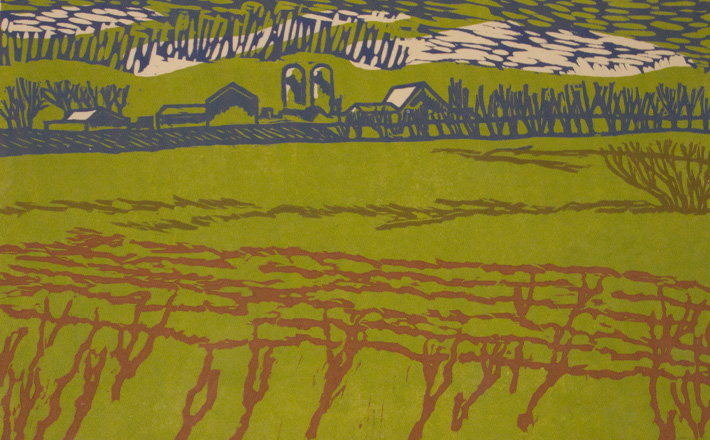Commentary on Psalm 49:1-12
So here is the hard truth.
The one that the psalmist doesn’t really want to admit. Money can make you happier. Sort of.
In a 2010 study by Daniel Kahneman and Angus Deaton at Princeton’s Center for Health and Well-being, research showed that income had a positive effect on both people’s emotional well-being and their life evaluation.1 Of course, this shouldn’t surprise us given that we tend to assume that poverty is likely to exacerbate the struggles of life and therefore lead to greater rates of unhappiness. And yet, it feels crass to make the inverse claim that more money will necessarily lead to greater happiness.
According to Kahnmen and Deaton, happiness suffers when people live below the threshold of $75,000 per U.S. household. That said, above $75,000 per U.S. household, the emotional well-being of subjects levels out. The struggles and strains of daily life for those above $75,000 balance the value of financial well being. Kahnmen and Deaton go on to report that while our happiness is unlikely to increase with income above $75,000 our life satisfaction will steadily increase with greater income. To put it more bluntly, money can only buy you happiness to a point, but money can buy you satisfaction.
This, I think, is an interesting place to begin reading this Psalm. By distinguishing between happiness and satisfaction we distinguish the emotional from the physical. According to Kahmen and Deaton, and the Psalmist, we can sate our desires with the stuff we buy. We can trust in our wealth to bring satisfaction. But satisfaction is not happiness, and, more importantly for the psalmist, satisfaction is not safety. Too often our desires to be sated morph into a confidence that our stuff will save us. The sad truth, according to the Psalmist, is that our salvation cannot be bought. This is both terrible news and good news.
First, the terrible news. Nothing we can obtain can prevent the approaching specter of death. No amount of work, toil, and good fortune will save us from the coming gleaning. The money might buy you a chance to have your named chiseled into granite on an important building, but in time, that building too will fall. Father Time is undefeated, and all of the pathetic attempts to stave off the coming death are, according to the Psalmist, pure vanity. In this way, Psalm 49 has an Ash Wednesday feel to it. We departed Lent long ago, but in this ordinary time, we tarry as we remember the cold day where ashes marked us as bound for death.
The great gift of Ash Wednesday is its ability to temper our grand visions. Psalm 49 and Ash Wednesday say, “you are dust. But not just you, you and everything you touch. That book you are writing, that work you are doing, the relationship you are cultivating. It will all crumble. It will all be forgotten. It will all die.” Bleak, I know, but necessary lest we too quickly embrace a sense that being remembered is part of our inheritance or that our work might save us. Psalm 49 pierces our entitlement by leading us to the grave and showing us that we are entitled to nothing more than a dirt nap.
The temptation when preaching on this sobering Psalm is to valorize those who live so close to death due to poverty. On the one hand, it is the privilege of the weak to have a more intimate relationship with death. The weak have eaten with death, supped with him in their homes, and they tend to have no grand visions of their own legacy. It is the privilege of the weak who have made peace with death to laugh at the strong as they wriggle under the pin of death. Yet, that the weak know death intimately does not give us permission to romanticize a group who would rather keep death a stranger. Intimacy with death is the terrible consequence of poverty. Valorizing poverty is an old and clever trick that shields us from the terrible ways in which poverty is not a choice, but a death sentence.
Our culture tends to venerate those who take vows of poverty. Even now we marvel at Warren Buffet as he promises to die penniless after accruing billions. What a sacrifice after years of living comfortably. Yet, the choice to give up our goods is different than never having goods to begin with. That the Psalmist criticizes those who place too much faith in their stuff, is not a license to venerate the impoverished as inherently holy. The truth is stuff doesn’t save us, but neither does the absence of stuff save us. According to the psalmist, the poor will meet death, just like the rich. Typically, the poor meet death quicker and with greater frequency than the rich.
Now the good news, which shows up obliquely in the Psalm. The Psalmist sings, “Why should I fear in times of trouble?” The Psalmist knows something that the rich do not: death is not just our enemy, but also our mother. Of course, death is coming, but death is not simply the end, it is also a new beginning. We are delivered into the hands of death, but death then delivers us into the hands of another. Verse 15 of the Psalm 49 reads, “God will ransom my soul from the power of Sheol, for he will receive me.” Finally, we do not abide forever in death’s hands. We will be received into the hands of God and, it seems it is death doing the handing over. Why should I fear death when death is just a way station, when sheol is just gestation, when the grave is just a lay over? The Psalmist has a complicated relationship with death and is unwilling to either hate death nor totally embrace death. The Psalmist realizes that death and life coexist in an inextricable embrace and that deliverance is a messy process.
Notes:
1 Daniel Kahneman and Angus Deaton, “High Income Improves Evaluation of Life but Not Emotional Well-Being,” PNAS, vol. 107 no. 38 (2010), http://www.pnas.org/content/107/38/16489?tab=author-info, accessed April 12, 2016.


July 31, 2016